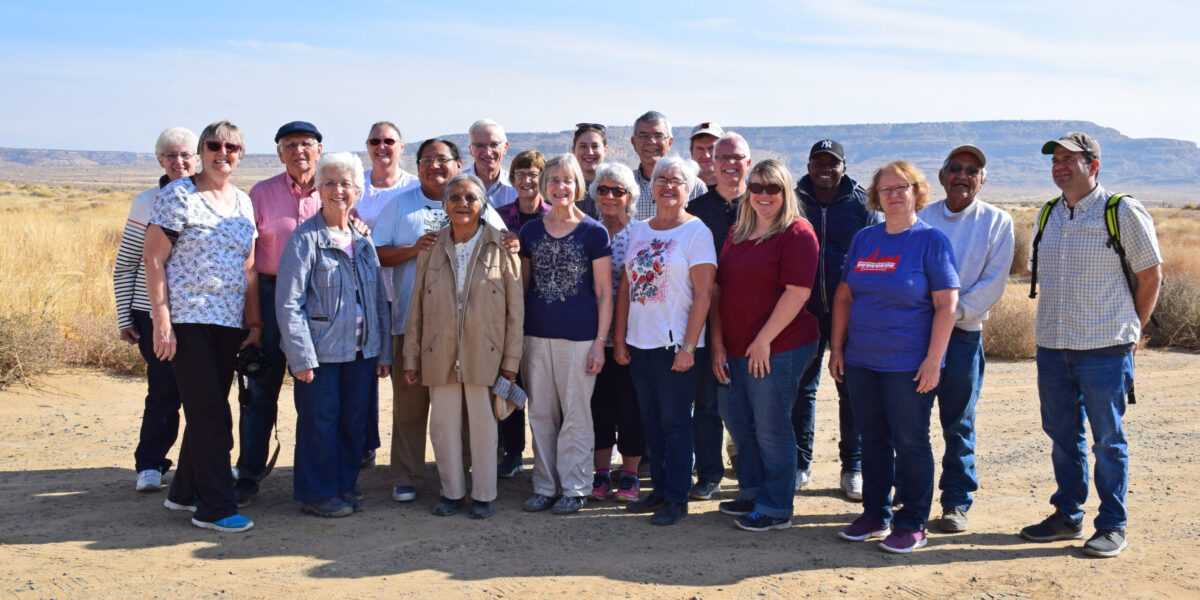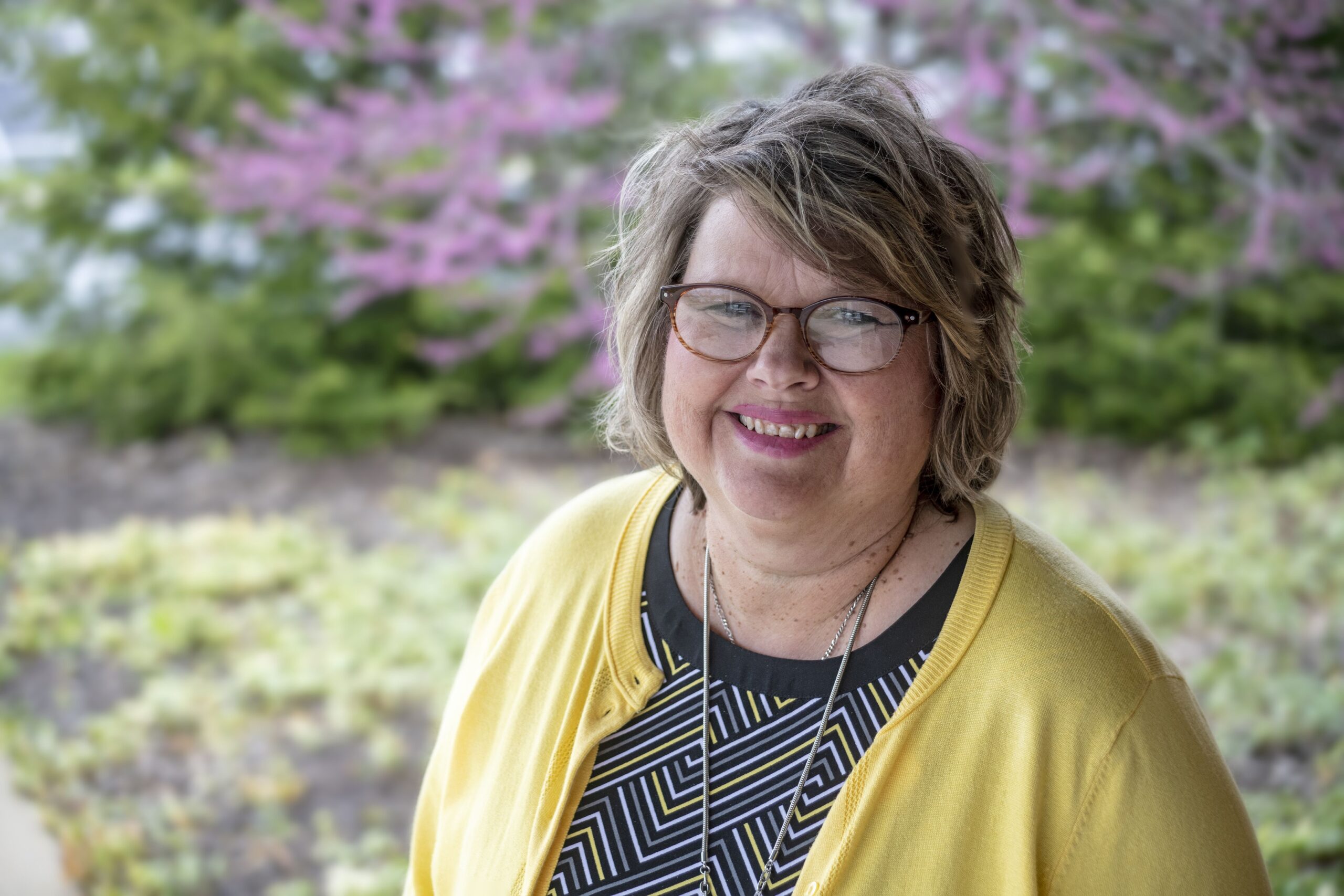NEWTON, Kansas (Mennonite Mission Network) — From the comfort of two vans, participants in Mennonite Mission Network’s alumni service-learning tour traveled through Arizona to gain greater understanding of the perilous journeys that migrants and indigenous people take through the same terrain.
From Nov. 9-17, 16 people — mostly alumni of Mission Network’s SOOP and Mennonite Voluntary Service (MVS) programs — encountered the desert, not as a vacation destination, but as a life-or-death ordeal. One of their trip guides, Katherine Smith, border and migration outreach coordinator for Mennonite Central Committee, encouraged trip participants to humanize the border situation by perceiving hope amidst hopelessness.
"It’s so easy to hear the words ‘migrant’ and ‘border’ and perceive only negativity," Smith said. "Yes, there are a lot of sad things, but my goal is to give you a different perspective. … I meet a lot of really resilient people who have come into the United States with a strength that empowers them to flourish despite all the obstacles they confront in our current immigration system."
During the first several days of the tour, Smith gave the participants an introduction to many of the issues they would engage with during their four major stops: Tucson, Phoenix, the border-wall city of Douglas far to the south, and the Hopi Reservation in Kykotsmovi far to the north.
Throughout the trip of nearly 2,000 miles, participants heard stories about migrants who had perished while trying to cross the desert. They participated in a vigil to honor them, served at SOOP sites and a migrant resource center, and visited Peace Academic Center. Center leaders are partnering with the local Hopi community in re-purposing the space that was formerly the Hopi Mission School (HMS). Many MVSers served at the former school. Currently, Peace Academic Center is a SOOP volunteer site.
At each location, participants were challenged to balance emotional burden with buoyancy. "This trip is inspirational and energizing in ways I didn’t expect," Judy Harder of Hillsboro, Kansas, said. "Hearing about all the realities and suffering is challenging, but in a grace-filled way."
Defying the death-dealing desert
The first two stops in Tucson and Douglas exposed participants to the plight of people fleeing violence, persecution and poverty in Mexico and Central America and seeking U.S. asylum and economic opportunities.
As a result of tightening U.S. immigration policies, fewer people are legally admitted into the United States, Smith said. Correspondingly, more people are detained, deported, and separated from their families. Also, due to increased militarization of the border, migrants are put into situations where their lives are put at risk through attempting to enter the United States.
"There have been a lot of deaths here in the Sonoran desert," Smith said. "Up to 127 bodies have been found recently, as well as the remains of 3,000 people that have been uncovered since 2001."
Maria Padilla, a nurse and healer in a Tucson trauma center, said she strives to heal and comfort those who have survived the heat, snakes and dehydration of the desert. They risk dying while trying to find a new home rather than enduring the severe sufferings back home, she said.
"Women come in here hysterical after being violated in the desert," Padilla said. "Sometimes people come in with sanitary pads between their toes to soak up the blood on their feet torn up by stumbling across the hot sands."
Padilla is an indigenous woman from the Mayo tribe south of Tucson where border-wall construction is tearing apart her family and desecrating sacred tribal sites and grounds. "We have lived here for time immemorial and used to travel back and forth freely," she said. "Not anymore."
While in Tucson, the group also worshiped Sunday morning, Nov. 10, with the multiracial Shalom Mennonite Fellowship. Shalom is home to a large SOOP network and supports several migrant ministries, including the Casa Mariposa Detention Visitation Program (CMDVP). Rocio Calderon, a former migrant employed at CMDVP as its program coordinator, gave a presentation Sunday evening about her pilgrimage.
Traveling south to U.S.-Mexico border wall
From Tucson, the group traveled south to the border-entry cities of Douglas, Arizona, and Agua Prieta, Mexico. That’s where Douglas-based couple Jack and Linda Knox, members of Shalom and migrant advocacy workers, provide education, prayer, and visits to a migrant resource center and women’s co-op in Mexico.
Even as he displays powerful compassion for the migrants, Jack Knox said he befriends border patrol agents who often, when faced with the responsibilities of doing their jobs, choose to become hardened to the human realities endured by migrants. "To help build friendships in the highly charged political climate, we sometimes invite the border patrol agents to our house for coffee or a meal," he said.
While in Douglas, the group also participated in a vigil held to honor migrants who died in the desert. As the vigil snaked along Pan American Highway, walkers shouted out the names of the deceased printed on the white crosses they carried. Some riders in passing vehicles looked kindly at them, while others stared woodenly ahead.
"I was so profoundly moved by helping to make known all the unknown people," said trip participant Glenda Moyer of Lansdale, Pennsylvania.
Traveling back north to Phoenix and Peace Academic Center
After experiencing two days absorbing information about border wall issues and ministries, the group traveled back north to Phoenix where they stayed at the SOOP house and served at partner food banks.
They also spent two days in Kykotsmovi, where Kay Neff and Lance Polingyouma served as guides. Neff chairs the Peace Academic School Foundation out of Newton, Kansas, and Polingyouma is the center’s cultural liaison and host. Polingyouma grew up going to a church started by Mennonites on the Hopi Reservation and was a former Hopi Mission School student. The Hopi community also hosted a "makers’ fair" of traditional crafts and foods as a way for their guests to connect more deeply with their indigenous background on the reservation.
Polingyouma said they are not trying to re-create the old paradigm of the school, begun by the former General Conference Mennonite Church in 1951 when there was only one other grade school on the reservation. "Now there are five grade schools," he said. "We are striving to make this more of a community center that provides such things as volleyball tournaments for families in the evenings and conferences on such topics as dry-land farming."
Peace Academic Center is currently offering pre-school and high-school equivalency programs. The center’s leaders hope to add new grades and activities as funds increase.
Trip transformation
Arloa Bontrager, Mission Network’s director of SOOP (Service Opportunities with our Partners) and Youth Venture (a summer learning-service experience for young adults), and Susan Nisly, director of Mission Network’s gap-year Service Adventure program, led the Arizona tour. Their first alumni tour in March focused on race dynamics in Mississippi. They are planning a second Mississippi trip for March 2020. For more information, contact AlumniTrip@MennoniteMission.net.
"These tours integrate learning with service and awareness with prayer," Bontrager said. "It is a powerful way to work out, and walk out, one’s desires for peace- and justice-making in our pain-filled world."








